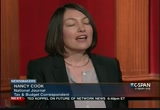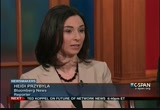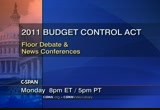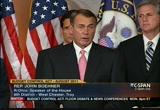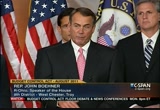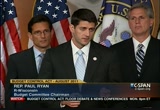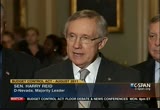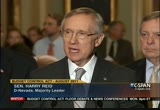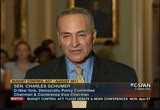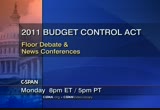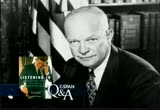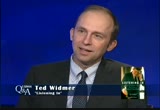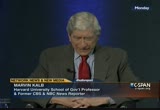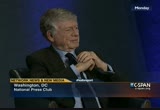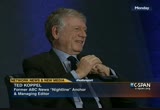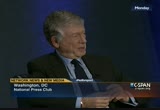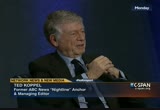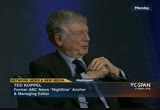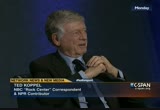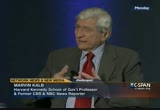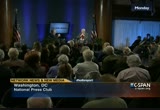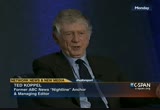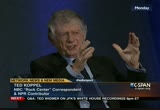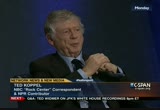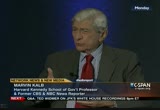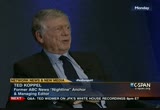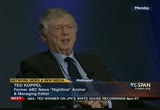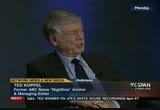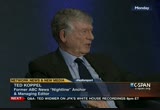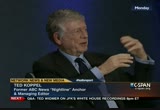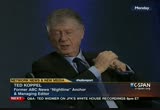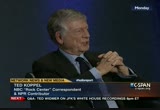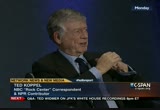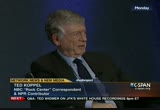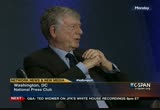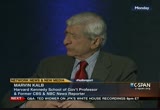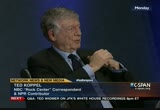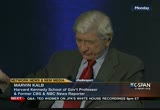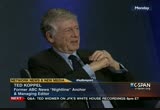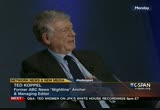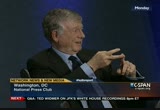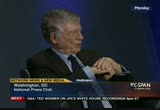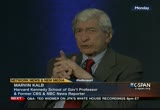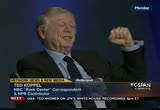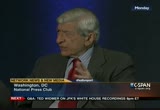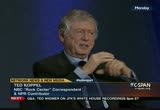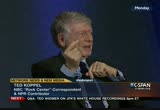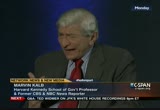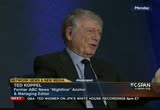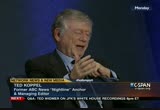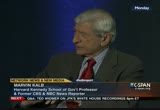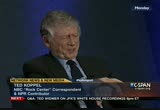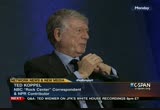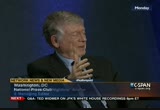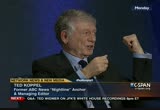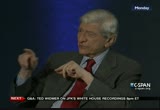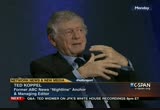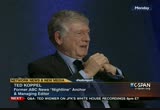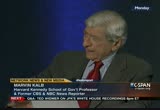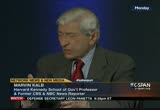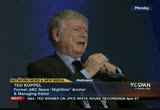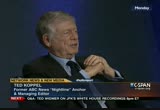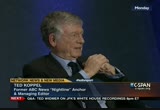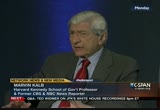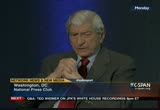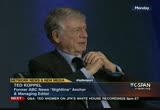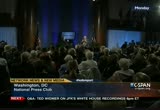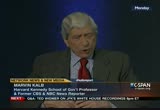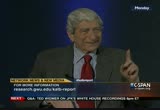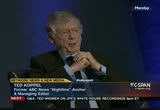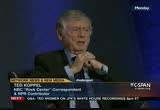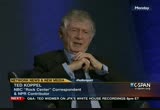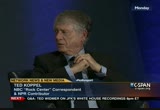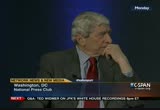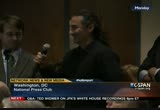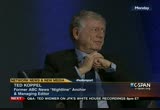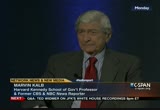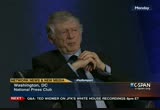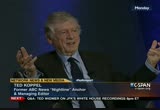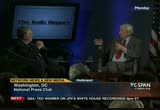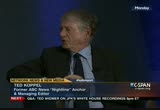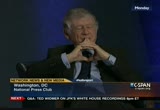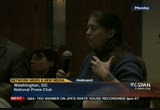tv Washington This Week CSPAN November 25, 2012 6:30pm-8:00pm EST
6:30 pm
quite concerned about it. nancy pelosi last week. people are waiting -- waning. >> it is not just the labor groups and liberal groups, ceos and the business roundtable -- ceo's and the business roundtable. >> the democrats have made very public today are talking to. they had the walmart ceo up there talking about the holiday season and how it is important to extend the cuts. i was told the other day the the republicans are getting their ceo campaign on entitlements. this week you're going to see a lot of focus on the entitlement portion of this. the republicans have held their tongues for the past couple of weeks, but privately they have said, the whole discussion up till now has been about revenue. there are starting to marshal their ceos to come out -- ceo's to come out and make demands on entitlements. >> so many of the business leaders, if you do not want to go over the fiscal cliff? -- fiscal cliff, they want it to be a stage set for tax reform. -- this week, you're going to see a lot of focus on the
6:31 pm
entitlement portion and the republicans have held their tongues. the whole discussion is about revenue. they are marshalling their ceo's to make demands on entitlements. >> so many of the business leaders don't want to go over the fiscal cliff. they really want tax reform to happen. whatever happens, they want this to be a stage setter. > thank you for being on "newsmakers." [captioning performed by national captioning institute] [captions copyright national cable satellite corp. 2012] >> tomorrow on c-span, we look back at august 2011, as the news conferences around the budget control act.
6:32 pm
this created sequestration. that is split 50-50 between defense and non-defense spending. >> in january, our first week that we were sworn into office, the present as for the increase in the debt ceiling and i made it clear that there would not be an increase in the debt ceiling without changes to the way that we spend the american people's money. shortly after that i was in new york. we agreed that there should be no taxes, as part of this agreement. but we have been able to achieve, we met those to standards that have been outlined. it is time for america to deal with the spending problem.
6:33 pm
we have listened to the american people, and make sure that we cannot get into the spot again. this is the the shot in the 20 years i have been here to build support for a budget -- a balanced budget. this is sorely needed, we have never gotten ourselves into the mess that we are in. this is important for the fiscal future but also for the fact that our economy needs to get going.
6:34 pm
beginning to take steps to fixing the fiscal problems, the people we expect to reinvest in our economy are doing a great job. >> we had a president asking us for a blank check and he did not get this. and a big increase on job creators. we got the -- we got that. and we have been trying to get discretionary spending caps in loss since i have been here for 13 years. we have been introducing legislation for the last eight years to get caps on spending. we could not get this the last time the republicans were in the majority. we see this as a good step in the right direction. every cent down payment in the
6:35 pm
deficit and a huge change in the culture of spending. you are spending less money on this this year than last year. we have a long ways to go. we really do believe that the value of this republican majority will change this culture. we had the gephardt rule. no one would have to be seen voting for the budget resolution. we would do this in plain sight. >> the debate was long and it was not easy. and they have watched or wondered why congress to get the job done.
6:36 pm
this was a bipartisan compromise, it was not the right wing cut, and whatever it is over there. that was not a bipartisan and this is nothing that we could agree to in the short-term. it was really a disaster for america. this agreement cuts the deficit by $1 trillion. we look forward to the work on the committee to make sure that the millionaires and billionaires and people with those yachts will have tax benefits, but that is in the mix
6:37 pm
of thinking what is going on. mr. schumer will talk about this in a moment with the jobs agenda that we have. we will make sure that america pays their bills, and make certain that all americans -- make sure that all americans pay theirs. >> we have averted a crisis in america has avoided defaulting on the national debt. the fears and concerns of americans across the board were considered by this congress, and as a result we have come together on a bipartisan basis. the down payment on the deficit included on this bill comes primarily from working families
6:38 pm
and those that were struggling in america. we will bring everyone together for shared sacrifice. we have a particular responsibility there. with $1.50 trillion, to make sure that when we do this, we do this in a fair and just manner for all of the people in america. when we return, center schumer will spell out how we address the number one issue in america, creating good paying jobs right at home for the people struggling in this economy. >> washington, the nation, the world can breathe a sigh of relief. the likelihood of a recession if we default has been averted, but we have a lot more to do. we have a lot more work to do.
6:39 pm
as leader reid and durbin mentioned, there were a lot of things we did like, making sure that no benefits in medicare and social security were cut. it is now time for congress to get back to our vote regularly scheduled programming, and that means jobs. washington has been consumed with the fault and our nation's unemployment problem has been worsening and it is time to move back jobs to the front burner. with this debt reduction package, the debt is now clear for a single-minded focus on jobs in september by removing the threat of default and proving that both parties can come together to get our deficits under control. we have provided certainty in
6:40 pm
the credit markets. the wrangling over spending should be greatly reduced in coming months. we have a chance to turn away from budget battles and reset the debate. the jobs issue, will have to play second fiddle to the deficit issue anymore, and that is what the american people want. we can put a premium on efforts to create jobs and as democrats, that is our strong suit and are high ground. we welcome this chance to shift the playing field to jobs. >> tomorrow night we will find more from august 2011, news conferences and debates as congress considered and passed the budget control act, to
6:41 pm
create the sequester that is set to take effect, and along with conspiring tax provisions, there is the fiscal cliff. this is monday night on c-span. join us tomorrow for a story on -- for a forum on foreign policy, the speakers from the bill and melinda gates foundation are set to talk about federal rules and the rights of federal enterprise. the live coverage begins at 10:00 eastern on c-span. >> general, what about if the soviet union, kruschev announces if we attack cuba, there will be nuclear war.
6:42 pm
>> we have these things i just believe this well. i want to keep my own people very alert. >> this is a fascinating moment. this is amazing that i just bele this well. i want to keep my own people very alert. >> this is a fascinating moment. this is amazing that eisenhower tells them to have his people alert. they go in completely on edge. then he says, hang on tight, which is a nice moment that they
6:43 pm
are able to joke a little bit with each other, especially during this crisis. they have a sense of how lonely that is to occupy that office. you are getting all kinds of advice, which kennedy was including, from his joint chiefs. he knew all about the military advice and was able to speak with the supreme authority, about the dangers as well as the advantages. then he says, hang on tight, which is a nice moment that they are able to joke a little bit with each other, especially during this crisis. they have a sense of how lonely that is to occupy that office. you are getting all kinds of advice,he was a very useful all. >> the secret white house recordings of john f. kennedy. >> ted koppel talked about the state of television news and how news consumption in the internet have affected reporting. marvin cowel heinterviews ted koppel, who is an interviewer on nbc. >> this is the cowell report with marvin cowell. >> hello and welcome to the national press club.
6:44 pm
i am marvin kalb. the conversation with ted koppel about democracy and the press. if i use the word twilight to suggest that network news, as we have known it, is on its way out and as something new is emerging. whether what is new will satisfy the urgent needs of our democracy cannot be noted at this time. let's hope that it will. without a free and occasionally rambunctious media, we will not be living in an open society. the free press and an open
6:45 pm
society are intimately linked, one dependent on the other. network news -- if network news is in its twilight, then perhaps our democracy is facing a turning point as well. i asked an old colleague and a friend, ted koppel, to discuss the changes in network news and what those changes might mean for our society. ted is known best for his 25 years of anchor and host of nightline, but he has also been a foreign correspondent, a war correspondent, and author, and he has covered many political campaigns. i shared something in preparing with this -- for this program. i ran into the following interesting thought. ted joined abc news in 1963. i joined cbs in 1957. if my arithmetic is right, together we represent more than 100 years of journalistic experience. i mean, that is enough to depress anybody. [laughter] so, ted, what in god's name have we learned about our sacred craft of journalism? >> i think we have learned not to make predictions. >> what are your predictions? [laughter] >> i predict that your title, provocative as it may be, may be premature. i think that when americans are
6:46 pm
finally realize how bad things are, and what terrible straits our political system is in, i think there may be a resurgence of the kind you and i grew up with. >> it is a marvelous, optimistic thought. >> actually, no, it is a terrible thought because it suggests that the ship will almost have to sink before people jump into the lifeboats again. >> do you think that we can, truly, even define journalism? if somebody walks in the room and came from mars, and said what are these just talking about? if journalism, explain it to that guy. >> i guess the simplest way is to take it back to where and you and i were young and began in this business. i will limit it to broadcast
6:47 pm
journalism. when you and i were young, there were three networks. if you wanted to be seen and heard on national television, you had to do it on abc, nbc, or cbs. when i was in vietnam in the late 1960's, mid-60's, late- 60's, if i did a piece in the field, it would be three days sometimes before that he's got on the air. it meant that you -- before that piece got on the air. it meant that you prepared your stories knowing and you had to survive two days, three days, sometimes even more than that. i have nothing but respect, admiration, and a little bit of sympathy for our colleagues today who quite literally have p with. to report almost all around the clock.
6:48 pm
>> lives. >> lives. whether there are working for television, radio, newspaper, there are going to have to file a blog, if there are going to have to tweet, do a little facebook number, the only thing i never see for which adequate time has been left is reporting. i sometimes wonder how they find the time to actually gather the material, but it is all there. we have a more immediate available to us today. more means of communicating information than have ever existed in the history of the world. we are so enchanted, though, with our ability to be fast, that i think there is sometimes a lost connection with what we are saying and why.
6:49 pm
>> i want to pursue that, but i want to ask you first -- why did you even get into this business? >> if i got into it for, probably, much the same reason you did. if that is unfair, because what i'm going to say, i do not think there would have been terribly good at anything else. [laughter] when i was born, and spent the first 13 years of my life in england, my father listened to the bbc. during world war ii to. i was just a little kid in those days. at least, my memory may be playing tricks on me, but i think i still remember hearing edward moore rose 0 reports and then rebroadcast on the bbc. and i swear, from the earliest childhood on, all i ever wanted to do and be was a journalist. preferably, as close to edward are murrow as i could make it.
6:50 pm
>> i did a piece for the new york times magazine on soviet youth. i think, in the spring of 1957. murrow read it like it called me and said, can you come talk to me about soviet youth? he was extremely curious. and, of course, i went down to talk to him and the secretary said as i went in, you have 30 minutes. that is it. max. >> that is okay with me. three hours later, she came in, and said, a think you have other evidence today. he used to get so absorbed in these things, that i have listened to him earlier and then met him.
6:51 pm
i was completely -- this was a great journalist. he was really interested in the things i was interested in. >> if you look back at to the man, i do not think he hired many women. >> there were a couple of women who were part of the world ii. but they did not last. after the war, it went off for different reasons. >> the people that he hired, where people of substance. historians. writers. people who cared about history. sometimes, when i look at what passes for news on cable television, especially, these
6:52 pm
days, i wonder where they find these people. >> he cared a great deal about right thing and one of the points you were making earlier about some things that you wanted to last for three or four or five days before there would get on the air, it had to be written and not written well. murrow cared a great deal about style and the way you presented information. >> i will interrupt you for a second. take a look at how awesome, when you are watching something beaned covered on table -- on cable television these days, it requires a great skill. i am not denigrating it in any fashion. but notice how often would you are hearing is just one ever comes off the top of their head of the man or woman who is reporting. take note of how risky it is for a script to actually be written -- take note of how rare it is for a script to actually
6:53 pm
be written. if you only have a couple of minutes, there really is still required. the essence of journalism not -- lies not simply -- on in the editing. in determining why one thing is important to a story and another thing is not. and putting it into some kind of context. occasionally, even historical context. you know, folks are pretty good at ad libbing, but that takes more skilled than most people have. >> you have taken us from what was and you have raised a little bit on what is in journalism today. what has changed? tick off the major changes. >> since you applied again? >> yes. >> first of all, the biggest change in always argue came
6:54 pm
about in 1968. in 1968, you have to understand, was an extraordinary year. it was the year of the offensive in vietnam. it was the year that lyndon johnson stepped down and said he would not run for president again. it was the year martin luther king was assassinated. the year bobby kennedy was assassinated. if the year of the riots at the democratic convention in chicago. it is not too surprising that women not pay as much attention as we shed -- it is not surprising that we may not pay as much attention as we should. the television news magazine began, "60 minutes." they have done an extraordinary job over these last 44 years. amazing work. but it also gives something that no television news program had never done before. it's made money.
6:55 pm
it turned a profit. [laughter] >> to be clear about that, up to that point -- >> if it happened, it was a rare thing. >> we were, for the most part, a loss leader. television news did not make money. >> it was bill who came to you folks who were producers and journalists at cbs and said -- remember? >> he used to call us the tools in his crown. >> he said do not worry about making money. >> that is right. you guys do not worry about that. what that meant is that when we went out to do a story, we were totally and absorbed in the story. we were not worried about how much money it would take to cover the story. ridges did it. -- we just did it. even as late as 1980, i remember being able to charter a plane from rome to istanbul, because you thought you might be able to get an interview with
6:56 pm
somebody important for your piece. but now, -- >> now, profits. we have become profit centers of the networks. and you know, off with the cable stations also. being a profit center is a huge responsibility because it means that you start thinking in a different way. you start thinking not so much about what the public ought to hear, but rather with the public wants to hear. you are now in competition with the other networks. with the other news outlets. not just for an audience, but you are in competition to make
6:57 pm
money. the way you make money, i will give you a for instance. i may be doing my former colleagues and injustice, but i seem to recall that the last one-hour documentary that played in prime time was on the subject of charlie sheen and his carousing, womanizing, all the other good things he was doing, which were clearly of enormous interest to all of you because that is why they put it on the air. it got a big audience. >> this idea of the difference between need to know and ought to know. >> when what you worry about is making money, you try to focus on those things that are a. most likely to attract an audience and b. least likely to cost a great deal of money. i remember eight years ago getting a call from my old friend and colleague, peter jennings. he said, ted, have the bean
6:58 pm
counters been in touch with you? i said, as a matter of fact, i just got off the phone with them. if what the bean counters want to do know from him and me, was, ted, how many times in a year does nightline use the muscle bureau? they had asked peter jennings the same question. how many times does world news tonight use the bureau? and then ask the same thing of the producer of and good morning america and than they did a simple calculus. so, the bureau coslet say $2 million a year and among all the programs, it was used let's say 50 times a year. $40,000 a report. wow. closedown the moscow bureau. what happened has happened, for the most part, at nbc, at cbs, at abc.
6:59 pm
most of the overseas bureaus now are essentially just mail drops where you may have some local employee keeping the office open and when something really big happens in kabul, in mexico city, in beijing, in hong kong, what you do is you should then one of the star correspondents or even an anchor. but the difference between covering the news, year after year after year in a country, maybe even learning the language, certainly getting to know the people, getting to know who the movers and shakers are
7:00 pm
>> i do not want to go too far. i want to talk to a little bit about the role of cable television, for which you touched on before. in a recent interview with bill o'reilly of fox, you said making -- derided ideological coverage of the news bad for america, you said, making it difficult, if not impossible, for congress to reach across the aisle and find compromise. you also wrote in an op-ed piece, this is not good for the rubble. what do you mean? >> this goes back. it is a continuation of the same thing. first of all, in addition to demonstrating that network news divisions could make money, there was a technological explosion. it wasn't just the three networks anymore. you have cable, satellite
7:01 pm
television, and the internet. so now there are hundreds, even thousands of competitors out there. what is incredibly cheap to put on the air is a couple of people like you and me just yelling at each other. >> talk. >> talking. what draws an audience is when, in fact, we disagree. when, in fact, we get nasty with one another. and what rupert murdoch's and roger ales demonstrated 15 years ago is that there really is a hunger in america for something that is less liberal for bhat networks were putting on the air. so, fox news was born. fox news has been hugely successful. it earns somewhere between one and 1.5 billion dollars a year. my current employers, the folks at nbc, had their own cable
7:02 pm
network, msnbc. it wasn't doing very well, it wasn't making any money. and they took a look at what fox done and they said, whoa, if they can make a billion and a half dollars a year doing news that skews to the right, if we could make half of that, let's skew to the left. and so, you have on cable television news that caters to people who consider themselves progressives, news that caters to people who consider themselves to be a conservative. you have the afternoon talk shows, the evening talk shows, which caters largely to the conservative. you have the late night comedy shows that tend to cater more to the left and the end result is that the area that has gone more or less fallow is serious news
7:03 pm
organizations reporting the important events of the day without any kind of political bias. we have grown up as a nation believing that we are entitled to hear view that is essentially resonate to the views that we already hold. and the end result of that becomes -- and we have seen it this year with a lot of distinguished senators, congress people, leaving, because, olympia snowe left the senate because she simply can't handle the nastiness anymore. there is an awful lot of that and you cannot in a democracy. >> you made the point. >> let me finish this one line, marvin. you cannot, in a democracy, expect people to be able to reach across the aisles and make accommodations for important issues if they are terrified
7:04 pm
that in so doing, it will expose themselves to the wrath of the either the right or the left. either jon stewart's humor or rush limbaugh's sharp tongue. >> so what you said not to too long ago was that the commercial success of both fox and msnbc has become a source of nonpartisan sadness for you. >> absolutely. >> meaning what? >> meaning that -- i mean, you and i have known for many, many years that we prayed in a business. operated in a business. but as you're saying a few minutes ago, that businesses to make all of its money with "i love lucy" and "jack benny" and "77 sunset strip" and whatever else was hot back in the 1960's and 1970's.
7:05 pm
they made so much money that they could afford to spend $50 million a year covering the world. that is no longer the case. and that is dangerous. >> my sense every now and then is that, though there are good journalists in cable television, the whole package of cable television when it is presented to the american people tends to debase just about anything it touches. that doesn't mean that every conversation is bad. but it does mean that the package, to me, comes through as a negative. as something that makes fun of people. that is overly critical. that is not real. >> fareed zakaria does a program on sunday mornings called
7:06 pm
"g.p.s." >> yes. >> first rate television journalism. fareed is a very smart man, he invites very smart people on his program and they talk about important issues in a smart way. i doubt that he has 200,000 people watching that show. that's probably a fairly big audience if he gets that many. it's on a sunday morning which is when programs like that still survive to one degree or another. but you're never going to see that program in prime time. during the week, never. >> in your judgment, since cable is the place where you're going to get, right, left, political conversation, and cnn living in the middle so awkwardly and trying desperately to keep its base, is it doing good things for our democracy in
7:07 pm
your view? >> no, of course not. is who doing good things? >> the idea of cable television. >> no. >> i feel, quite often, if you eliminated msnbc, fox, and cnn, it would probably improve american democracy overnight. [laughter] things would miraculously get better. people would talk to one another again rather than engage in an artificial fight which is what most cable television is. >> look, you take someone like rachel madou, for example. >> very bright. >> rachel maddow is a very smart woman and could easily in the old days, and today, i would love to see rachel maddow as the anchor of one of the evening news programs on network
7:08 pm
television. but the price of that would be that she would have to keep her opinions to herself. it is her opinions that draw the viewership on msnbc. now, she is a very bright woman, as i said. but i do not want to know what she thinks about these issues. i really don't. i want to hear her informed reporting. i want to hear her interview people with that sharp mind of hers. i do not want to know where she comes down on a particular issue. but that is seen as hopelessly old-fashioned. >> i was about to say. ted -- >> those days are over. >> yeah. as a matter of fact, excuse me for a minute. i just want to take a minute to remind our radio and television audiences that this is "the kabl report," i'm marvin kalb. our guest today is ted koppel, the subject, the twilight of network news.
7:09 pm
ted. you have described the good old days of journalism as an imperfect, untidy little eden of journalism. you then went on to say that these days, broadcast news has been outflanked and overtaken by scores of other media options. help us understand the need, the perceived need for these changes, because they not only affect the quality of network news -- by the way, do you agree with me that it's in a twilight zone now? >> it is in a twilight. but remember, twilight is usually followed by night and then dawn follows night. so i am still hopeful. [laughter] i'm still hopeful. you know, it is not going to stay this way forever. i think, you know, what tends to happen in this country as you and i have observed over the last 50 or 60 years, we tend to
7:10 pm
go too far to the right, and then we correct course and pass through to the middle and go too far to the left, and then we correct course again. i think what's happened to broadcast journalism requires a course correction. as we come to realize that our educational system is not as good as we like to believe, that our health care system is not as good as we like to believe, that we are spending -- i mean, there are so many things that are on the brink of taking us into real disaster. not the least of them being the possibility of cyber warfare. that is something that television news ought to be covering big time. i am tremendously concerned by the fact that the american
7:11 pm
public and its military have never been as far apart as they are right now. we know nothing. we do a terrific job of calling everyone in uniform a hero. we do a terrific job of welcoming them at airports and saying "thank you for your service." we know nothing about what is going on in the military. and what is more, the military and military operations are being launched on the basis of drone attacks, cia operatives, special operations forces out in the field, and all of that back by civilian employees, civilian contractors, and we know next to nothing about what is being done by any of these groups. >> because the reporting is not being done? >> well, i mean, look. it's because we have found that keeping -- that, a, the american public won't stand for a draft. that, b, the professional
7:12 pm
military was not enough to fight all over the world as we are now fighting. we have been focused on iraq, we have been focused on afghanistan. we actually believe that all the troops are coming back from afghanistan. i will tell you here and now that is not going to happen. we will still have u.s. troops in afghanistan one year from now and two years from now, five years from now. where's the press. >> where is it? >> obviously, these are not issues that the people who run our news programs today -- >> why not? >> because they don't draw an audience. what draws an audience is charlie sheen. what draws an audience is people yelling at each other. it is not enough to say these issues are important. we actually -- i know it sounds totally idealistic, but when you and i became journalists as
7:13 pm
young men, we actually believed that we were entering, really, a special, chosen profession that meant something to a democracy. >> we called it a calling. >> a calling, exactly. and when you got into it and when i got into it, i was tremendously fortunate and ended up making a lot of money later on. word of honor, i never thought i was going to get rich as a journalist. you do not go into journalism to become wealthy. you don't go into journalism to become wealthy. >> the changes we are talking about, you have already touched on this, the effect it has on our society, on the business itself. on journalism itself, value systems change. i'm not saying we can ever return to the good old days.
7:14 pm
that's gone, that's done. but what worries me is whether we can takeig the value systems of old and try to see them preserved in the digital environment of today. do you think that is possible? >> i not only think it's possible -- i mean, you and i are, in a sense, we need a third person here half our age telling us what is being accomplished in the digital arena. >> what do you think is being accomplished? >> i think that there are people who are doing -- what was the word i told you before that's -- we're both having a senior moment. when two guys at the same time have a senior moment, it's really bad. what's the word i'm looking for. people who -- who, in effect, look at all the blog sites. >> curators. >> curators, thank you.
7:15 pm
>> i, you'll notice, did not -- >> well done. there are curators today who because there are so many hundreds, so many thousands of websites, make at a point of saying, look, if you really want to know what's good, what's interesting in the area of foreign policy or, let's say, persian gulf, or let's say the environment or let's say cyber warfare, we can lead you in the right direction and the technology is there soy so that and i can gather material, gather information in a fashion that is infinitely easier than the one we used to use 40 years ago, 50 years ago. we can sit at our laptop right now and we can harvest information. >> with the reporting, you are getting a ton of information.
7:16 pm
these curators can provide any amount of information. but how reliable is the information? >> exactly. >> is it based upon actual reporting? >> two key points have to be made. a, there is brilliant material out there that is being well reporter according to standards that you and i would envy. >> how do you know that? >> because i have been told. [laughter] on the other hand, the implication of your question is absolutely correct. we don't know often. when something comes across on the internet we have no way of knowing what its provenance is, we have no way of knowing what the intention, what the goals, what the bias is of the people who are putting that out there and i'll tell you something that i learned the other day from one of these ted talks. i don't know if you're familiar -- it has nothing to do
7:17 pm
with me, these ted talks. and it was on the subject of google. the speaker was making the point that he is what would be called a progressive and he said a friend of his who is very conservative, they took their respective laptops, their computers, and they simply typed into the search engine the word "egypt" and they got totally different responses. why? because there is a process going on. every time we search for something on our laptop, we are not only gathering information, we are giving information about what we buy, about what we like, about what we find interesting, about perhaps what our political biases may be so that in theory a search engine that ought to be
7:18 pm
giving me objective information -- and you and i ought to get the same information if we type in the same word. not so anymore. that's kinda scary. >> because somebody is making up his or her mind as to what it is that we want. >> it's not somebody. it is a series of o's and 1's. it is a series of -- it is the computer -- what is the word i'm looking for algorithm, thank you. >> the algorithm is find and i understand that it exists and i respect it and i will salute it. it's there. but i want to know what all of that has to do with journalism. who gets up in the morning and covers something? who's going to go out and cover a war? who's going to go out and cover a campaign? without the journalist being
7:19 pm
there doing the a, b, c's of information gathering, honest information gathering, all of this other stuff is bologna to me. >> there are plenty of people who are going to do gathering, but the key word -- >> let me interrupt. that's not true. in the coverage of war today, there are fewer reporters the war in afghanistan now than there's ever been. fewer. >> fewer american reporters. >> american and others as well. >> i frequently, of an evening now, will watch the bbc or al jazeera, because, particularly when things are going on in the middle east, i'm going to learn more from the folks out there who actually speak arabic and know the area and know the region. >> do we know they are reporters? we know they speak arabic. >> we know they are reporters.
7:20 pm
do we know they are objective reporters? that's a different question. >> do we know that? we don't. >> we don't. but the fact of the matter is, weave almost given up on objective reporters in our own country. >> that's my question. >> it is still possible, it is still possible, and you and do it every day to pick up the "new york times," to listen to npr, to pick up the "wall street journal," to watch the news hour. the outlets are there. our old friend jim lehrer used to say, we're the program that dares to be dull. i once said to jim, sometimes, my friend, i think you're a little too daring. [laughter] but, it's there. there is still good journalism being committed. the good journalists cannot help it if the public in droves seems to be moving in other directions.
7:21 pm
i'm simply making the point and i don't know whether i'm wishing for this to happen -- because, as i say, i think it will only happen when people realize how devastating the consequences are of not having objective journalists out there. >> do you know clark kent? >> know him well. we have on occasion use the same phone booth. [laughter] >> clark kent is no longer the reporter for "the daily planet." >> what does he do now? >> he is a blogger. if you pick up -- >> where does he change? [laughter] >> probably in the curator's kitchen. something like that. but that is an indication of how profoundly different journalism of years ago to today. i'm not saying there isn't
7:22 pm
journalism today. i'm saying that it's so much more difficult to find and it's -- the areas they'll go out to try to find it are not terribly reliable. and i'd like to think about sort of the north star of journalism today. when you started, you had somebody like ruh narledge at abc who did accordingly things at that network, including starting "nightline." with me, it was ed murrow and a lot of other people at cbs. but who are the arlidges and the murrows of today in today's world? >> look, fact of the matter is, when rone arlidge came on, he had been the president of abc sports and we at abc news were terrified of this guy who came in wearing his jungle suit and his red -- i mean, his golden
7:23 pm
bracelets that he wore and he was not one of the champions of great journalism when he came on. he became that. he evolved and he evolved in some large measure because he ran up against immovable objects like howard k. smith and frank reynolds, and people who still believed that good journalism was important. and nobody. >> he turned. he recognized good journalism and moved toward it. >> he recognized it. i will tell you the back story of "nightline." for about a year before the iran hostage crisis, rone arlidge came to us in the news division and said any time something of real major importance happens, i
7:24 pm
want to do a late night special on it, 11:30, 10 minutes, 15 minutes, i don't care. he initially wanted a one-hour news cast at the dinner hour. at 6:30. the affiliated stations would not go along, so he decided he was going to seize that time, and by the time we got to the iran hostage crisis, we were running out of things to say. after about the fifth day, the sixth day, the seventh day. we were running out of things to report. and rune said to us, i don't care. tell me the difference between a sunni and a shiite. about the shah and how he came to power. tell me, i don't want care what. he kept that program going, because he recognized there was a tremendous american appetite for this story. had it not been for that appetite, "nightline" would never have been born.
7:25 pm
>> and also, you were at abc, which did not have a very program in that time slight. you didn't have a "tonight show," for example. >> or a letterman show. >> something like that. >> i will tell you something that has changed enormously. when "nightline" began in march of 1980, you did not have the letterman show yet on cbs. they would rerun some old cop drama. but among the three programs, "the tonight show," the cop drama and "nightline," we had 70% of all the homes watching television at 11:30 at night. >> really? >> 70%. these days, "the tonight show," "nightline" and the letterman show are lucky to have 25%. that's what's happened because what you didn't have 35 years
7:26 pm
ago was cable, satellite, you know, the internet, and all of those things have diluted the importance and the reach of the networks. >> so maybe twilight is too soft a word. >> no, because you still have -- i mean, even though it's only 25%, the evening news casts, for example. among the three of them, i suspect they still have between 15 and 20 million viewers every night. >> more than that, 20 to 25 million. >> 20 to 25 million. when you and i were reporting from the state department, it was 40 million, 50 million. cronkite alone probably had about 20 million people. >> every night. that certainly is true. the responsibilities of journalism to democracy and to
7:27 pm
our society -- i want you to talk about about a little bit more. i want you to explain to me why there is this connection between the flow of news and a vibrant society. >> look. if the american public, the public, is ignorant of the issues, is uninformed, how can it make intelligent decisions about whom to pick? it's bad enough that the citizens united decision of the supreme court has now resulted in, i think the "new york times" the other day said at that amount of money that was spent on all the election campaigns, all of them, $6 billion. now, i was shocked by that.
7:28 pm
i moderated a discussion the other morning between karl rove and james car vill and rove's reaction -- >> how lucky can one guy be? [laughter] >> it was actually -- it was fascinating. but mr. rove made the point that we spend infinitely more than that on dog food. >> that's absurd. >> yes, it is, it is. because, as much as i have always loved our pets and loved pets in general, the fact of the matter is, if our elections end up being reduced to the snarling and shouting and innuendo, you know, people keep saying, things were worse in jefferson's time. yes, they were. but you only had broad sheets that were being distributed. you didn't have everyone walking around with his or her own little communications device.
7:29 pm
information now is spread so ubiquitously, is spread so quickly, so instantaneously, that if we don't have reliable, trustworthy, objective sources of information, then our whole electoral structure is going to collapse of its own weight. >> you know, ted, there was that cnn story during that awful hurricane sandy week. about how the new york stock exchange was under three feet of water. of course, it wasn't true, it wasn't true at all. cnn got that story, not from one of its reporters. cnn got the story from an online message board on the national weather service's website so they got a line, "three feet of water, new york stock exchange," and they put it out. i don't want to pick on cnn
7:30 pm
because it could have been done by somebody else, too. but that, to me, is one of the dangers in trying to retain a best standard, some practice, some place where you can turn and say, this is the right way of doing things and this is simply wrong. and i have the impression these days, despite all of the good things thank you very much said about -- that you have said about all the curators and whatever, all of that stuff being said, i am left with an uneasy feeling that i don't know where all of the information is coming from. >> right. >> i don't have a feeling that -- remember years ago when we knew every cameraman who was taking pictures of some big event in cairo. we knew exactly, joe musruv of
7:31 pm
cbs was taking that picture and you knew that it was an objective look at what was happening at that time. i don't have any feel for that at all today. i don't know who's taking the pictures. i don't know that they're even working for a network. they may be working for some small outfit hired by the network because the network doesn't want to bring in its own cameraman who will have to pay too much. >> if you watch more than one news h cast in an evening, notice the number of times you will see precisely the same video on all three networks when it comes from overseas, in large measure because the networks don't have their own reporters, don't have their own camera people over there anymore and they have bought is all from the same single source. point number two, what is wrong, after all, with having a local reporter covering the event, the local reporter, after all, speaks the language, knows the people.
7:32 pm
well, let's say that local reporter is reporting from tehran and that local reporter knows that if he or she makes a misstep in what he or she reports, they'll be arrested, they'll be thrown in jail. the american reporter may get thrown out of the country but that's probably the worst thing that's going to happen. and finally, i find that there is absolutely no willingness on the part of our critics to believe that objectivity in journalism is possible and i keep hearing, how can you -- there's no such thing as absolute objectivity, to which i say, when you go to hire a lawyer, do you ask that lawyer, tell me, do you like me? i mean, do you really, really like me, because if you don't like me, you're not going to be able to put your heart into this thing -- you expect that lawyer to act as a professional. when you go to see a doctor,
7:33 pm
you're not asking that doctor what his or her politics are. you simply want that doctor to deal with you on the basis of her best professional expertise. and whether or not our critics want to believe it, i argue and i think you'll agree with me, that there really was a time and there really remain in this country today men and women who can be professional journalists, capable of objectivity. that doesn't mean that they don't go home at night and rale against the darkness. it doesn't mean they don't have favorites in an election, but it does mean that -- i mean, to this day, you've known my wife, grace ann, for many, many years. grace ann doesn't know how i vote in an election. >> really? i don't tell her. i don't think it's appropriate. >> wow.
7:34 pm
and you're still married? [laughter] >> let me put it this way, she knows everything else about me. i think she can figure it out but i've never told her. >> that's so interesting. what is that -- what does that say? what does that really indicate? >> it indicates, you know, i have believed since i was a very young reporter that my personal opinions have no place in the reporting that i do. >> but when you talk to somebody like bill o'reilly, for example, who was my student many years ago, and i should have flunkd him. [laughter] bill believes profoundly, deeply that you are -- you're a biased guy, you're the left. why? because you worked at abc. i, he's given up on years ago, definitely of the left because i was at cbs. and i would say to him, you
7:35 pm
haven't a clue as to how i vote. he said, of course i know, everybody knows. and that attitude has been accepted as a kind of truth. >> that's what i'm saying. >> by so many people. >> absolutely. and, you know, until we are prepared to accept the principle that objectivity or at least the -- a genuine effort toward objectivity in journalism, is possible, we're going to be, you know, the late great daniel patrick moynihan used to say, everyone is entitled to his own opinion, not entitled to his own facts. these days we turn that on its head. these days we believe that everyone is, indeed, entitled to his own facts. you want right-winning facts. we have the factory for you. you want left-wing facts, we have the plant that will put it out for you. >> how can we make it clear to
7:36 pm
people that if they watch, for example, nbc nightly news, cbs evening news, world news tonight, there is -- there is a basic imfluls on the part of the anchor and the reporters to tell it straight. but cable is where you're getting the opinion. >> cable says you're getting opinion, also, on the networks. so everybody is running around in a circle pointing fingers at else saying you're as biased as everybody else but you're not admitting it. >> look, i don't think it's so much a matter of bias at the networks. >> i don't think so at all. i agree. >> i really don't. i think the problems at the networks these days is they simply are not putting the money into the kind of news coverages that vital to a democracy. >> how would the money help? >> the money would help in that you would, for one thing, open up your -- when has the world ever been in your experience a
7:37 pm
more dangerous place than it is right now? and i happen to believe that at the worst times of the cold war -- yes, we went to the brink of nuclear war with the cuban missile crisis but the fact of the smarter there was a balance between the great powers. these days, we need information from the third world more than we have ever needed it before. we don't have the reporters out there. >> that's absolutely true. and i'm sorry to say at that time that weave run out of time. >> it happens. >> which is the relentless clock, as relentless for older reporters. i think the clock ought to pay more respect for people like us. but anyway, i want to thank our wonderful audience here for being polite and nice and being with us tonight and they have been able to seinous this magic of the internet. if they flick on right now, they
7:38 pm
can actually see us, not just on cable, but they can see us through the internet all over the world. it's a magnificent thing. i want to thank our guest, ted koppel, for his time and sharing his insights with us. [applause] >> let me close with the following thought. we are all dazzled by the digital age and understandably so. the speed, the access, everything live, it's truly amazing but every now and then i worry that we may be losing sight of the fact, this new technology is only a tool. it's a tool for the dissemination of what we, as have discovered. it can never be considered more important than the content of what we have discovered --
7:39 pm
hourly daily broadcasts, a story that needs telling, a crime or misdeed or misjudgment that needs exploring. i look out and i ask you all, there are any new edward r. murrows in this audience? we need you now more than ever to help sustain our democracy, good, honest, bold, unafraid, even, on occasion, rambunctious, outrageous journalism, is essential to democracy. murrow once said, "this is no time for fear" and he was right. so young murrows, rise up, rise up. ted and i have done the best we can. now it's your turn. use these modern tools but use them well because otherwise, as murrow once said, it's all just lights and wires in a box. so that's it for now.
7:40 pm
i'm marvin kalb, quoting murrow once again, good night and good luck. [applause] [captions performed by national captioning institute] [captions copyright national cable satellite corp. 2012] >> as you've been warned, this is your time to ask questions. there are two microphones. i see one over there and one over here. if you get up to ask a question, that's going to be fine. please identify yourself and the idea is to ask a question. don't make a speech because i'll you off. i'll be very nasty. why don't we start here right, please. go ahead. >> how are you doing, old friends. i remember our days in the state department. can you assess the coverage of the israeli-palestinian conflict? is it fair? who's doing the best job? and are the wars and horrors of
7:41 pm
africa and asia any less important because they don't get coverage? >> let me take the second half of that question first. there has been a war going on in congo for well over 10 years now. it has cost more than five million lives. >> five million. >> five million people who have died of starvation, disease, have been driven into the jungle, died there, people who have been killed in fighting -- than five million people. barely covered. we have barely even noticed it. i mention that because journalism, like foreign policy, is frequently affected by national interest. to the degree that there is a
7:42 pm
that what happens in the congo is less important to the united states, we don't cover it. we are infinitely more engaged right now in what's happening in syria, but the coverage of what's happening in syria is not bad but i don't know that it's shed a great deal of light and part of the problem is, even there, you were asking about -- i know you began by asking about what's happening in gaza right now and that i what i think of k konk -- coverage of that, i did hear you correctly? >> yes. >> any time israel is involved in a story it, becomes an excruciatingly difficult story for american journalists to cover because there is a -- for the most part -- a natural
7:43 pm
sympathy in this country, a sense of identity in this country with israelis and many reporters, old friends and colleagues of mine, the late peter jennings, used to, i think, very unfairly be criticized for taking an anti-israeli point of view. it wasn't so much an anti-israeli point of view as that he had spent many years living in the arab world and had a sympathetic point of view to arabs. i think what is happening in gaza right now meets almost any definition of tragedy. the israelis cannot be expected, on the one hand, to stand by while their cities are rocketed. on the other hand, the great irony, the paradox in that story is because the i.d.f., the
7:44 pm
israeli defense forces, are infinitely more professional than hamas fighters, the number of casualties on the palestinian side are always going to be much greater, thereby leaving an impression that there's somehow something unfair about the war. this is precisely a time when you need correspondents who have spent years in the region because, by and large, you ask me what i think of the coverage. i think it's surface. it focuses on the obvious, the casualties. you don't hear much about the underlying causes or what the underlying possibilities may be for agreement between the two sides. i think that's one of the things we have lost in not having resident correspondents who
7:45 pm
report from a region year after year after year. >> it's interesting, just an additional point there, ted, that a couple of nights ago abc world news tonight had christian ammanpor in jerusalem. she happened to be doing another story when the gaza story erupted and diane sawyer turned to her and said she there was to do the inside story but they gave her 45 seconds to do the inside story and she couldn't get it out. it was very difficult. that is yet another dimension of trying to make everything bite sized, even an analysis by a reporter who really does understand that story, would have been wonderful to hear more from her. yes, please.
7:46 pm
>> good evening, i'm jean carlo gonzales with talk radio news converse. you mentioned, an interesting point before mr. kabl cut you off -- >> he does that all the time. >> about our intelligence service. it was a moment when you were talking about how our intelligence services were maybe stretched too thin. i'm putting words in your mouth. but you were intimating that because we were not only having a lack of journalists in different parts of the world but we were also stretched -- >> affecting the intelligence community, as well. >> there was another question but i thought, you said something and i thought maybe i could give you that moment to expand on that because i thought that was fascinating considering how the american public tends to trust the demagoguary, the left or the right. >> but do you have a question. >> and the question is, mr. koppel, can you elaborate on that point?
7:47 pm
>> yeah. >> thank you. >> point i was going to make is that essentially the same thing is happening within the intelligence community as is happening within the television news community and that is there's the perception that technology is an adequate replacement for human intelligence. there is the perception in television news that you can use the satellite, you can use a jet plane, you can get somebody in from anywhere -- i mean, from the united states, you can reach any part of the world in 18 hours or less, right? and by virtue of the satellite, you can report instantaneously. but that doesn't substitute for having a reporter who's been on the ground for years. the same thing is true for the same reasons in that the intelligence community is also suffering budgetary cuts and people are being told, look, we can get the same kind of information with electronic
7:48 pm
intercepts, with satellite reconnaissance, with technology, in other words, when, in point of fact, having a human agent on the ground gives you a depth, a third dimension, that you cannot get from the technology alone. >> yes, please. >> hi, i'm ann o'leary, retired foreign service officer. i began my career in the u.s. information agency when people still remembered edward r. murrow. i ended it shortly after afghanistan. as a state department public diplomacy officer with a press officer who had never worked with the press nor spoke dari. i'm wondering if those of you in the networks ever noticed that usia went away and if you'd think that was part of the weakening of the ability to report stories with great
7:49 pm
objectivity overseas? >> marvin and i became friends after i came back from three years in indochina and was assigned to the state department as diplomatic correspondent. i have been blessed throughout my television career with having marvin kalb and bernie kabl as competitors and as you may imagine, you don't travel with people from your own network, you travel with the opposition. and i was really blessed in having these two men as opponents of mine. during the years that we traveled together covering henry kissinger in the middle east, we always had someone from voice of america on the plane and i remember a woman by the name of
7:50 pm
kunig, wasn't it? >> marie. >> marie kunig, who was the voice of america reporter, and she didn't talk much. she wasn't the much belaboring henry kissinger with questions, she wrote very clean copy and she was a very good reporter. and i think -- i haven't been a diplomatic correspondent in many years so i don't travel with the secretary of state anymore but i rather suspect you don't have from v.o.a. traveling with the secretary anymore and that's a loss. >> i want to share something with you all. being a competitor with koppel, when we travel around the middle east, in those years, i had a very bad back condition, and when we'draphy -- we'd arrive somewhere, we'd all have our
7:51 pm
portable typewriter and overnight bag and the big stuff went in the plane. abc news picked up very often my typewriter, my overnight bag he could see i couldn't pick it up. that's being a good competitor, being a sweetheart. yes, please. >> i'm david earl. mr. koppel, i was hoping you could talk about what you define as objectivity, is it moderating two political sides, and where does your analysis come in, i would use the example of global warming, how would you have that story in that time? >> what story? >> the story of global warming, when most of the scientific community is on one side but it's a politicized community. do you accept who you deem to be the most credible people in that discussion? >> yeah, look, you're looking at a man -- i was, for almost 26 years, both the anchor and the
7:52 pm
managing editor of "nightline." and i was deaf on reporter who would go out and give me one opinion for, one opinion against, and one right down the middle. it is the laziest form of journalism there is in the world. to the degree that one side or the other can be ascertained as having the facts on its side, you have an obligation to report that. i don't think there's an obligation to say, you know, on the one hand, newtonians believe that an apple will fall from a tree and will hit the ground and there is a law that says that and simply because there's some idiot out let there who claims t apples float. so, no, objectivity does not mean taking one of this side and one of that side and presenting
7:53 pm
both for the audience to select. your job as a journalist is precisely to go out, to do the reporting and then as i said earlier on, to analyze it, to separate the wheat from the chaff, to put it into a proper context and if the overwhelming scientific community or if the scientific community overwhelmingly says there is global warming, do you give a nod in the direction of some other intelligent voice? yes, why not, but not, you know, you certainly don't do it on the basis of equal time. >> and that first one, the pressure first was directed at the networks to be objective and fair, what they would do, as you remember, they would put a republican up here for 30 seconds and a democrat here for 30 seconds and then they were being objective and they felt
7:54 pm
they were telling the story but they never got at the essence of objectivity as i think you have so well described it tonight. yes, please. >> i'm catherine rodriguez, and i'm a junior, journalism major at g.w. my question is, in this highly volatile political climate, weave -- we've noticed several instances where major news headlines rushed to a headline that turned out to be wrong like with wonderful blitz -- wolf blitzer and the obama care supreme court rulings. how do we balance accuracy with the desire to be the first to break the news? >> terrific question. >> i have been lecturing quite literally for 25 years or more about this desperate struggle to be first with the obvious. which i think is often sort of
7:55 pm
the driving engine, particularly of 24/7 cable news. somehow -- and this goes back to the times when there were just three networks -- there would still be, you know, when a major story broke, i still remember moments of huge self congratulation at abc and i'm sure it was the same at cbs and nbc if we could say, we have the story 1:38 before cbs did and i remember saying at the time and i was a young journalist at the know of anybody out there, the american public, that's, who is sitting there as we were sitting in our newsrooms with a bank of 10 television monitors, aware of the fact that cbs may have had something first, nbc got it second and oh, my god, we were third.
7:56 pm
if you were at home watching television, are you switching madly between and among channels and what was bad 25 years ago is absolutely horrendous today. you know, if i'm watching cnn and i think if they're doing a fairly decent job of covering a story, i am not constantly again, that may be generational. i have teenage grandsons who seem incapable of watching anything for more than eight seconds at a time without switching to another channel. but, no, i -- did i answer your question? >> not really. >> yes, yes. was a very good question. there's one more here and you're going to be the last one, i'm afraid, because we're out of
7:57 pm
time but i apologize to everyone else waiting to ask a question. i'm sorry, but when this is all over, why don't you besiege mr. koppel and you can get your questions answered. >> and beat him up. >> thanks very much for taking my question. i'm cat shrier, graduate student at the university of maryland and have an online news site -- cool, clear, water citizen news, talking about water that is usually considered dull and boring in a way that's fun and sexy and cool and engaging and we have all these tools not just to disseminate -- >> ask your question, please. >> to get the information out and throughout the evening it seems like we have been given this choice of charlie sheen reporting, perhaps of less significance and important, significant news that affects our lives presented in a way that's dull and when we have so many tools at our disposal, why
7:58 pm
do we need to think of important news as being something that can't be cool and engaging and fun and even profitable and why does it have to be presented as something dull as an alternative? >> thanks. >> well, you may be surprised to learn that i don't entirely disagree with you. for many, many years at "nightline," i used to tell the staff, there is no story out there that we cannot do in an engaging and interesting way. i think you've made perhaps the understandable mistake of interpreting what marvin and i have been saying, when we refer to important, that important means, even in our minds, dull. on the contrary. i think the most interesting things in the world are precisely those things that are most important and i think it is
7:59 pm
our obligation as journalists not merely to say here are the facts, do with them as you will, but to put those facts into -- and perhaps i should have added the adjective, "interesting" context. we have to make the news interesting or we can't expect anybody to watch but if interesting means controversial, if interesting means argumentive, if interesting means sacrificing objectivity, then i guess you're right, in that case, i'm doomed to be seen as dull. >> i don't think you've ever been dull. thank you, ted, very, very much. and thanks all of you for being here. it's a terrific evening. [applause] [captions performed by national captioning institute] [captions copyright national 2012]satellite corp. 2012]satellite corp. >> tonight on
159 Views
IN COLLECTIONS
CSPAN Television Archive
Television Archive  Television Archive News Search Service
Television Archive News Search Service 
Uploaded by TV Archive on

 Live Music Archive
Live Music Archive Librivox Free Audio
Librivox Free Audio Metropolitan Museum
Metropolitan Museum Cleveland Museum of Art
Cleveland Museum of Art Internet Arcade
Internet Arcade Console Living Room
Console Living Room Books to Borrow
Books to Borrow Open Library
Open Library TV News
TV News Understanding 9/11
Understanding 9/11